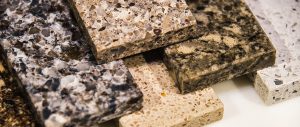Talk Like a Designer: Quartz vs. Natural Stone

What’s the Difference Between Quartz & Natural Stone Countertops?
If you’re looking into getting new countertops for your home in Palmia, California, you’ve probably found that quartz and natural stone are at the top of the list as some of the best options available. But what exactly is a quartz countertop and how does it differ from natural stone options like granite? The distinction may not be all that clear by looking at beautiful images of newly remodeled kitchens, so let’s start by looking at how these countertops are made.
How Are Natural Stone Countertops Made?
Natural stone countertops encompasses a wide array of materials, with options such as granite and marble topping the list in terms of popularity. Granite, which is the most common natural stone used for countertops, is quarried from the ground. It is then cut into slabs, polished, and finally cut into the custom shapes needed to fit the kitchens they’ll be installed in.
How Are Quartz Countertops Made?
Natural stone has been used for countertops for decades, whereas quartz countertops are relatively new to the market. Quartz countertops contain large amounts of crushed quartz that are mixed with a small amount of resin. You can think of quartz countertops as “engineered stone.” It starts with a natural stone product that is then engineered for superior performance.
Pros & Cons of Natural Stone Countertops
One of the primary reasons homeowners choose natural stone countertops, such as granite, is design versatility. Natural stone countertops are available in an enormous array of styles, colors, and patterns to suit design preferences ranging from modern to traditional. Additionally, stone such as granite and marble are exceptionally durable and resistant to damage and heat. If treated properly, granite countertops can last for decades.
There are some downsides to natural stone countertops. For example, stone such as granite is porous, which means they must be sealed to prevent staining and the accumulation of bacteria. Compared with quartz, natural stone countertops will require more maintenance. What’s more, although natural stone is durable, it can easily crack or chip is a heavy object is dropped on it.
Pros & Cons of Quartz Countertops
Quartz countertops have a lot of advantages. Like natural stone countertops, quartz is available in a wide variety of unique colors and patterns, so with either option, you’ll likely find a look Outside of appearance, however, quartz offers several distinct advantages over natural stone. First, because quartz is engineered, it has a non-porous surface. Therefore, it does not need to be sealed, is naturally stain resistant, and offers better durability than stone.
When it comes to downsides, quartz countertops have few. Some homeowners’ with more traditional tastes don’t like that quartz countertops tend to have a more contemporary look. And, quartz countertops are often priced higher than many other materials, although they are comparable to high-end natural stone. However, ease of maintenance, incredible strength, and lasting beauty makes quartz countertops an excellent investment.
Contact Reborn Today
At Reborn Remodeling Solutions, we offer a variety of options for residents of Palmia, CA, looking for new kitchen countertops, including both granite and quartz models. Contact us today and an expert from Reborn will be happy to discuss your options and help you select the perfect option for your home.
